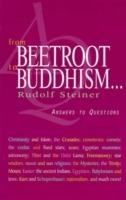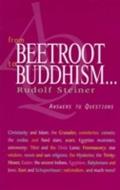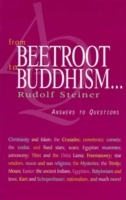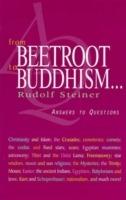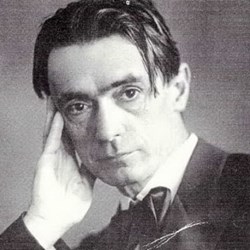From Beetroot to Buddhism: Answers to Questions
16 lectures, Dornach, March 1 to June 25, 1924 (CW 353) The remarkable discussions in this volume took place between Rudolf Steiner and workers at the Goetheanum, Switzerland. The varied subject-matter was chosen by his audience at Rudolf Steiner's instigation. Steiner took their questions and usually gave immediate answers. The astonishing nature of these responses - their insight, knowledge and spiritual depth - is testimony to his outstanding ability as a spiritual initiate and profound thinker. Accessible, entertaining and stimulating, the records of these sessions will be a delight to anybody with an open mind. In this particular collection, Rudolf Steiner deals with topics ranging from beetroot to Buddhism! He discusses, among other things, Christianity and Islam; the Crusades; cemeteries; comets; the zodiac and fixed stars; scars; Egyptian mummies; astronomy; Tibet and the Dalai Lama; Freemasonry; star wisdom, moon and sun religions; the Mysteries; the Trinity; Moses; Easter; the ancient Indians, Egyptians, Babylonians and Jews; Kant and Schopenhauer, and nationalism. This volume is a translation from German of Die Geschichte der Menschheit und die Weltanschauungen der Kulturvoelker (GA 353).
-
Autore:
-
Traduttore:
-
Editore:
-
Anno:1999
-
Rilegatura:Paperback / softback
Le schede prodotto sono aggiornate in conformità al Regolamento UE 988/2023. Laddove ci fossero taluni dati non disponibili per ragioni indipendenti da Feltrinelli, vi informiamo che stiamo compiendo ogni ragionevole sforzo per inserirli. Vi invitiamo a controllare periodicamente il sito www.lafeltrinelli.it per eventuali novità e aggiornamenti.
Per le vendite di prodotti da terze parti, ciascun venditore si assume la piena e diretta responsabilità per la commercializzazione del prodotto e per la sua conformità al Regolamento UE 988/2023, nonché alle normative nazionali ed europee vigenti.
Per informazioni sulla sicurezza dei prodotti, contattare productsafety@feltrinelli.it
